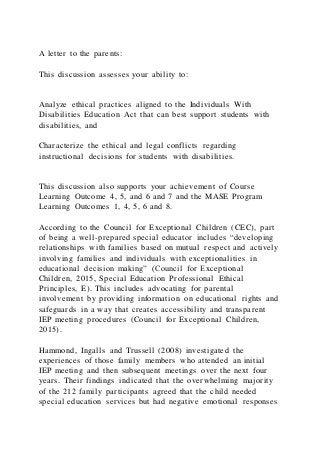A letter to the parentsThis discussion assesses your ability to
A letter to the parents: This discussion assesses your ability to: Analyze ethical practices aligned to the Individuals With Disabilities Education Act that can best support students with disabilities, and Characterize the ethical and legal conflicts regarding instructional decisions for students with disabilities. This discussion also supports your achievement of Course Learning Outcome 4, 5, and 6 and 7 and the MASE Program Learning Outcomes 1, 4, 5, 6 and 8. According to the Council for Exceptional Children (CEC), part of being a well-prepared special educator includes “developing relationships with families based on mutual respect and actively involving families and individuals with exceptionalities in educational decision making” (Council for Exceptional Children, 2015, Special Education Professional Ethical Principles, E). This includes advocating for parental involvement by providing information on educational rights and safeguards in a way that creates accessibility and transparent IEP meeting procedures (Council for Exceptional Children, 2015). Hammond, Ingalls and Trussell (2008) investigated the experiences of those family members who attended an initial IEP meeting and then subsequent meetings over the next four years. Their findings indicated that the overwhelming majority of the 212 family participants agreed that the child needed special education services but had negative emotional responses to the initial team meeting. Some of the most beneficial information collected included acknowledging the emotions tied to having a child initial diagnosed with a disability; stronger communication skills by education professionals during the team meeting; and additional measures to better prepare parents for the team meetings (Hammond, Ingalls, & Trussell, 2008). Similarly, the article, Building Parent Trust in the Special Education Setting (Links to an external site.) (Wellner, 2012) was written to emphasize the importance of trust building strategies to avoid costly due process hearings and to maximize relationships with all involved in making decisions on behalf of the student with special needs. Initial Post: After reading the article, After reading the article, The 5-Point Plan , reviewing the Council for Exceptional Children’s (CEC) , reviewing the Council for Exceptional Children’s (CEC) Special Education and Professional Ethical Principles and Practice Standards (Links to an external site.) , and reading Building Parent Trust in the Special Education Setting (Links to an external site.) you will create an initial response depending on the first letter of your last name. If your last name begins with the letters A – M: You will respond as one of the parent participants in this the Hammond, Ingalls and Trussell study. Begin by explaining how you felt attending your child’s first IEP meeting, using the article and the Instructor Guidance as a foundation for your narrative. Then, describe how future IEP meeting exp ...

Recommended
Recommended
More Related Content
More from mecklenburgstrelitzh
More from mecklenburgstrelitzh (20)
A letter to the parentsThis discussion assesses your ability to
- 1. A letter to the parents: This discussion assesses your ability to: Analyze ethical practices aligned to the Individuals With Disabilities Education Act that can best support students with disabilities, and Characterize the ethical and legal conflicts regarding instructional decisions for students with disabilities. This discussion also supports your achievement of Course Learning Outcome 4, 5, and 6 and 7 and the MASE Program Learning Outcomes 1, 4, 5, 6 and 8. According to the Council for Exceptional Children (CEC), part of being a well-prepared special educator includes “developing relationships with families based on mutual respect and actively involving families and individuals with exceptionalities in educational decision making” (Council for Exceptional Children, 2015, Special Education Professional Ethical Principles, E). This includes advocating for parental involvement by providing information on educational rights and safeguards in a way that creates accessibility and transparent IEP meeting procedures (Council for Exceptional Children, 2015). Hammond, Ingalls and Trussell (2008) investigated the experiences of those family members who attended an initial IEP meeting and then subsequent meetings over the next four years. Their findings indicated that the overwhelming majority of the 212 family participants agreed that the child needed special education services but had negative emotional responses
- 2. to the initial team meeting. Some of the most beneficial information collected included acknowledging the emotions tied to having a child initial diagnosed with a disability; stronger communication skills by education professionals during the team meeting; and additional measures to better prepare parents for the team meetings (Hammond, Ingalls, & Trussell, 2008). Similarly, the article, Building Parent Trust in the Special Education Setting (Links to an external site.) (Wellner, 2012) was written to emphasize the importance of trust building strategies to avoid costly due process hearings and to maximize relationships with all involved in making decisions on behalf of the student with special needs. Initial Post: After reading the article, After reading the article, The 5-Point Plan , reviewing the Council for Exceptional Children’s (CEC) , reviewing the Council for Exceptional Children’s (CEC) Special Education and Professional Ethical Principles and Practice Standards (Links to an external site.) , and reading Building Parent Trust in the Special Education Setting (Links to an external site.) you will create an initial response depending on the first letter of your last name. If your last name begins with the letters A – M: You will respond as one of the parent participants in this the Hammond, Ingalls and Trussell study. Begin by explaining how you felt attending your child’s first IEP meeting, using the article and the Instructor Guidance as a foundation for your narrative. Then, describe how future IEP meeting experiences changed (improved or declined) and why. Finally, using the
- 3. CEC Professional Practice Standards for Parents and Families (Links to an external site.) and Building Parent Trust in the Special Education Setting (Links to an external site.) , provide at least three suggestions to the special education team leader for how to improve this experience for parents of newly diagnosed children with disabilities.